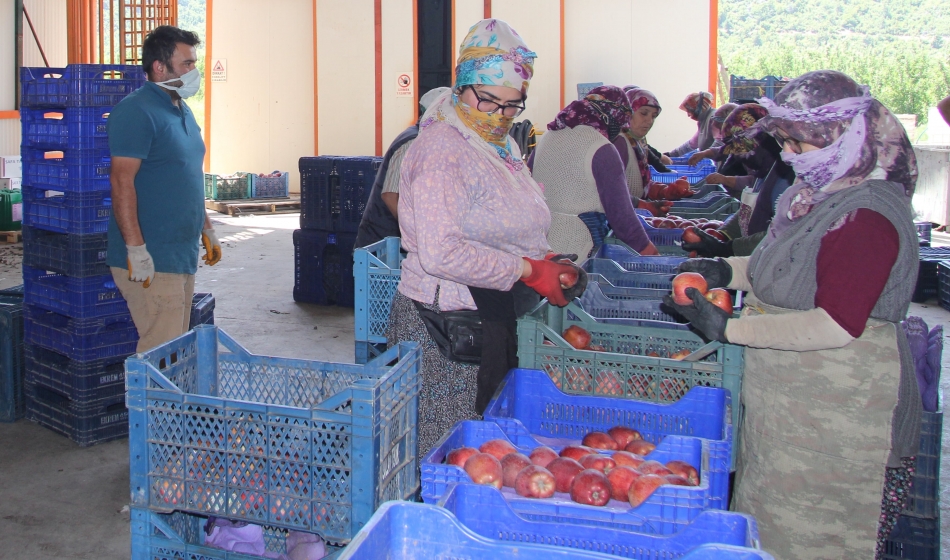20/08/2024 Apple production, as old as human history, thrives to this day in Türkiye. While the market is dominated by a few varieties with high market value, the country boasts 460 registered local apple varieties in total, each with its own colour, taste, smell and even shape.
The country is a major producer of apples worldwide, having contributed roughly 5 percent of the 95 million tonnes of apples produced around the globe in 2022. According to the Turkish Statistics Institute, almost 4.8 million tonnes of apples were produced in Türkiye that year, with one in four apples (almost 25 percent) coming from the Isparta province.
But all that production can have a downside.
Apple production is practised on 95 percent of the 3 500 ha area of orchards in the Eğirdir region within Isparta. Most of these orchards sit by Lake Eğirdir, the second-largest lake in Türkiye, which makes the lake prone to contamination caused by excessive and inappropriate pesticide use. Experts suggest that pesticides and other toxic chemicals deposited in the lakebed affect the local ecosystem and impact soil and water quality. And due to its high level of pesticide use, this monoculture apple production can cause increasing pesticide resistance.
Considering the high importance of apple production in this compact area and the relatively higher risks arising from pesticide use, the Food and Agriculture Organization of the United Nations (FAO) and its national and local partners have been addressing the adverse environmental impacts of intensive chemical inputs during apple production.
In 2020, FAO began a series of integrated pest management (IPM) trials in the region to encourage apple producers to promote greener alternatives to conventional farming practices while reducing pesticide use and associated risks. IPM is a holistic strategy that considers all available pest control techniques, incorporating measures to discourage pest population growth while maintaining economically justified pesticide levels and minimizing risks to human health and the environment. IPM emphasizes natural pest control mechanisms and recommends responsible pesticide use as a last resort.
During four years of trials in Türkiye, FAO’s aim has been to understand how IPM and alternative pest control methods can enhance product quality and market value while reducing pesticide use. This was done in collaboration with the Ministry of Agriculture and Forestry, the Directorate of Eğirdir Fruit Research Institute, Isparta University of Applied Sciences and Isparta Young Business People Association.
Developed with FAO’s national partners, the trial methodology has tested and introduced various alternative pest control techniques against key apple pests such as codling moths (Cydia pomonella), mites (Panonychus ulmi and Tetranychus urticae) and scab (Venturia inaequalis).
During the first year, the use of biotechnical control tools and the IPM approach cut the use of pesticides to control codling moth by up to 70 percent from the conventional approach of 30-plus chemical treatments by a single apple farmer per season – all without reducing the net profit per hectare. Additionally, the results showed that IPM practices help lower pesticide residues in the final products.
Based on these encouraging results, the scope of the IPM trials was expanded to 30 beneficiary apple producers with almost 70 ha of apple orchards in the Isparta region in 2021 and 46 farmers and almost 90 ha in 2022. The project distributed 165 000 pheromone dispensers to trap pests and disrupt their mating cycles, thus reducing the need for pesticides. In addition, beneficiary producers received season-long monitoring and guidance. The results again showed that pheromone dispensers could help reduce pesticide use, on average, by more than 70 percent, with some producers not even applying pesticides at all.
FAO also conducted apple scab control trials in 2022, but due to the dry weather that year, apple scab did not occur as a major disease.
The 2021 and 2022 trials emphasized that the IPM approach in apple production requires less labour, effort, and input costs than the use of conventional pesticides. Apples could be obtained with no residue risk and without damage to the environment or increased pesticide resistance.
During the last year, trials of a more holistic approach were conducted in the Eğirdir Research Institute’s trial fields. In addition to efforts to combat codling moth and scab, 740, 000 beneficial insects (Phytoseilus persimilis) were released to control two-spotted spider mites (Tetranychus urticae) without the need for any pesticides use. This confirmed effectivness of the holistic approach applied at trial fields.
A 2023 meeting with former beneficiary farmers showed promise in the sustainability of FAO’s interventions. Aware of the health risks posed by pesticide use, farmers have actively continued the IPM practices. The pheromone dispensers, which they have been paying for themselves, are more efficient than chemical treatments in tall trees, they said, due to the difficulty of reaching the entire tree during spraying. Plus, women are much more involved in placing the dispensers, increasing their participation in farming overall.
Throughout the four-year trials, around 300 apple producers (in addition to the beneficiary producers) were trained in the region. Former beneficiaries estimated that another 150 fellow farmers switched to the new practices after seeing the positive trial results.
In addition, local partners keep advocating the succesful results of the trials to boost the awareness among producers about the pesticide risks and greener alternatives. FAO also conducts studies for understanding the status of pest resistance and its management with IPM strategies in apple production in Türkiye to guide for better production approaches.
I am proud of FAO’s efforts in Türkiye to revamp the way farmers produce the apples we all love and enjoy. Healthier and safer production is better production, and FAO’s trials in Türkiye have helped prove that FAO, working alonside local farmers and other partners, can help build resilient and sustainable agrifood systems that benefit local communities and the entire globe.
